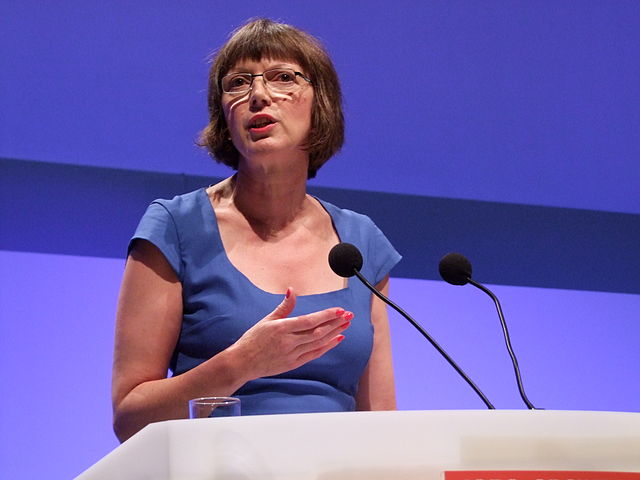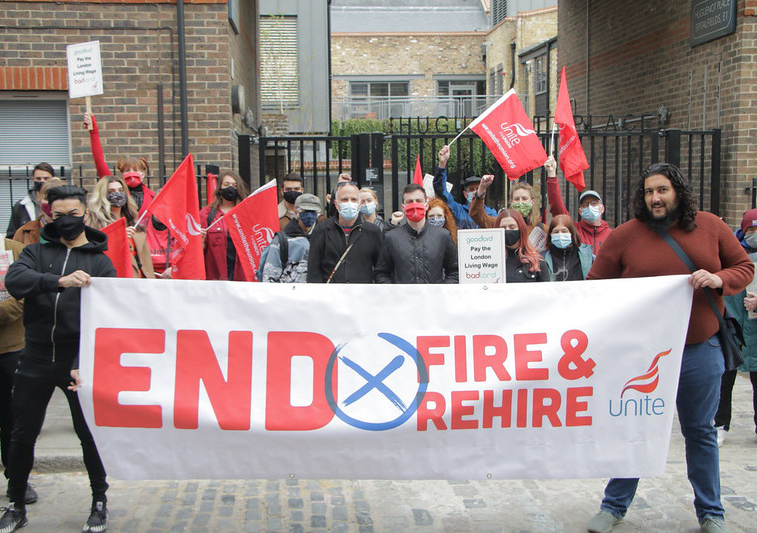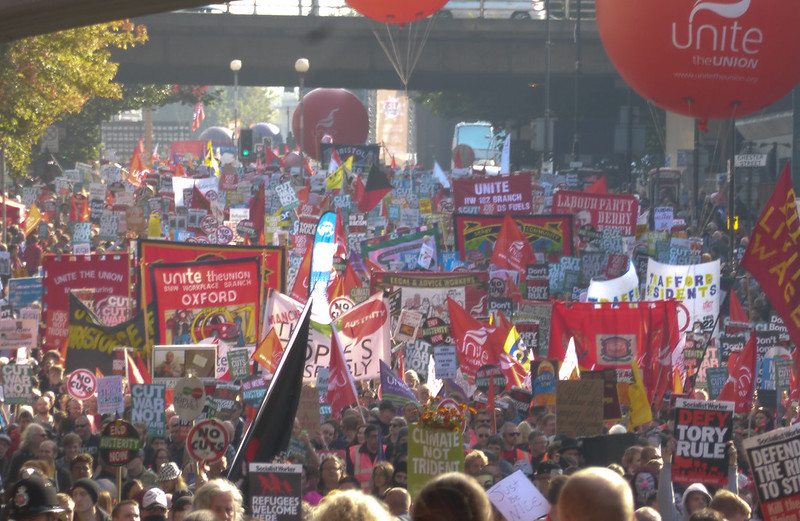With a tsunami of austerity and attacks looming, the TUC [Trades Union Congress] is meeting this weekend to discuss the way forward for workers in Britain. The trade unions need a fighting programme, and a militant, unified resistance to the Tories and bosses.
The situation facing the working class is stark. We are in the midst of the worst crisis of capitalism in over 300 years. The economy is in an absolutely decrepit state. And the bosses are going on the offensive in order to boost their profits, at workers’ expense.
In order to prop up the system, the Tory government has so far borrowed the eye-watering sum of £400 billion. This will have to be paid back. And one way or another, it will be the working class who are made to foot the bill.
This means that an all-out assault on wages and conditions is on the cards – whether in the private or public sector. The swathe of fire-and-rehire disputes breaking out across industry is a harbinger of what lies ahead for workers everywhere.
Plans for huge staffing cuts are being prepared on the railways. Local government and public services are facing a further wave of austerity, with councils plunging into bankruptcy. And the government is demanding pay restraint at a time when inflation is beginning to bite.
Starmer’s Labour, meanwhile, has done nothing to oppose any of this, with the party’s leadership spending more time attacking left-wing members than attacking the Tories. As a result, workers are increasingly turning to the industrial front in order to fight back.
Earthquakes
In this context, the need for a fighting labour movement has never been greater.
Given this, the recent election results in Britain’s two biggest unions reveal a growing mood of discontent amongst the organised working class.
In Unison, the country’s largest public sector union, the left have made significant gains. Having come within a whisker of taking the general secretary position, Paul Holmes and the left-wing activists grouped around the #TimeForRealChange banner have secured a solid left majority on the union’s NEC for the first time in its history.
Unite, meanwhile, is the country’s second largest union, representing workers in many important industries, such as manufacturing and construction, as well as in the public sector.
Under the leadership of Len McCluskey over the past decade, the union has been seen as a bastion of the left in the labour movement.
Most predicted that continuity candidate Steve Turner or right-winger Gerard Coyne would take the top job in the recent Unite general secretary election.
In fact, however, it was left-wing underdog Sharon Graham who came out on top, with a campaign aimed at grassroots members, which focussed on workplace organisation and struggle.
Graham’s campaign galvanised a whole layer of rank-and-file members and shop stewards. This factor proved decisive in her victory.
While the specifics may vary, the overall trend beginning to emerge here is clear. Workers are turning away from compromising and cautious leaders – whether those leaders are drawn from the right or the ‘official’ left – and are instead voting for candidates who promise to adopt a more fighting stance.
Off our knees
Given this rising mood, it is clearly past time that the TUC got off its knees.
 TUC general secretary, Frances O'Grady. Throughout the course of the pandemic, the TUC leaders have bragged about how they've "worked with" the Tories / Image: Johninnit
TUC general secretary, Frances O'Grady. Throughout the course of the pandemic, the TUC leaders have bragged about how they've "worked with" the Tories / Image: Johninnit
At present, the TUC’s leaders boast about how they’ve been ‘working with’ the Tories throughout the pandemic. It often seems that they’ve spent more time posing in the government’s photo-ops than they have supporting those workers who are fighting them!
With the crisis deepening, and the class struggle sharpening, the TUC cannot continue with this same attitude of complacency and conciliation.
If the current TUC leadership refuses to face up to the tasks at hand, then these new left forces in Unison and Unite must join up with existing left unions – such as PCS, FBU, CWU, BFAWU, and others – to form a leadership that will.
Lessons and potential
The need for a unified struggle has never been greater.
A decade ago, in 2011, we saw the potential such united action could have, when millions of workers took part in a coordinated one-day strike over public sector pensions.
Had a determined, fighting leadership existed at the time, this pensions dispute could have been escalated and developed into a movement capable of bringing down the Tory-Liberal coalition government.
Instead, having marched workers to the top of the hill, right-wing leaders such as Dave Prentis marched them back down again – capitulating and accepting the government’s rotten deal. Without a clear strategy, the energy dissipated, leading to a long lull on the industrial plane in the years ahead.
United struggle
The potential for powerful united action still exists today. Gathered together, the unions in the TUC represent some 5.5 million workers across the public and private sectors. And there is no shortage of issues around which such action could be coordinated.
 Workers are facing attacks by the bosses across the board. Where they are left by the trade union leaders to fight back on a localised, atomised level, workers will be more easily picked off. A united struggle is needed to meet the bosses' offensive / Image: Socialist Appeal
Workers are facing attacks by the bosses across the board. Where they are left by the trade union leaders to fight back on a localised, atomised level, workers will be more easily picked off. A united struggle is needed to meet the bosses' offensive / Image: Socialist Appeal
Isolated and atomised, workers can easily be picked off by the Tories and the bosses. And even when important concessions or inspiring victories are won – such as in the Manchester bus drivers’ battle against fire and rehire – this does not stop the employers coming back for more.
In many cases, meanwhile, it is whole factories or industries that are being threatened with closure, due to the long-term crisis of British capitalism. This, alongside the scandal of privatisation and outsourcing, raises the need for nationalisation and public ownership, which goes beyond the walls of individual workplaces.
Similarly, all the old anti-trade unions laws are still in place. And more are being added, with recent Tory legislation aimed at repressing protests and pickets. Added to this are widespread scourges such as blacklisting and ‘fire and rehire’.
All of this demonstrates the need for a generalised struggle: not just in this-or-that workplace, or even in this-or-that industry and sector, over this-or-that issue; but the building of a movement capable of dealing a knockout blow to this criminal Tory government.
Programme of action
This perspective is exactly what should be discussed at this weekend’s congress.
Not only would a fighting strategy give existing union members confidence in their own strength, but it would also galvanise currently unorganised workers across the economy, who – with a concerted effort – could be brought into the fold of the labour movement.
Armed with a militant programme of action, and organised around bold socialist demands for nationalisation and workers’ control, such a force could begin to turn the tide and offer a way forward for workers everywhere.
